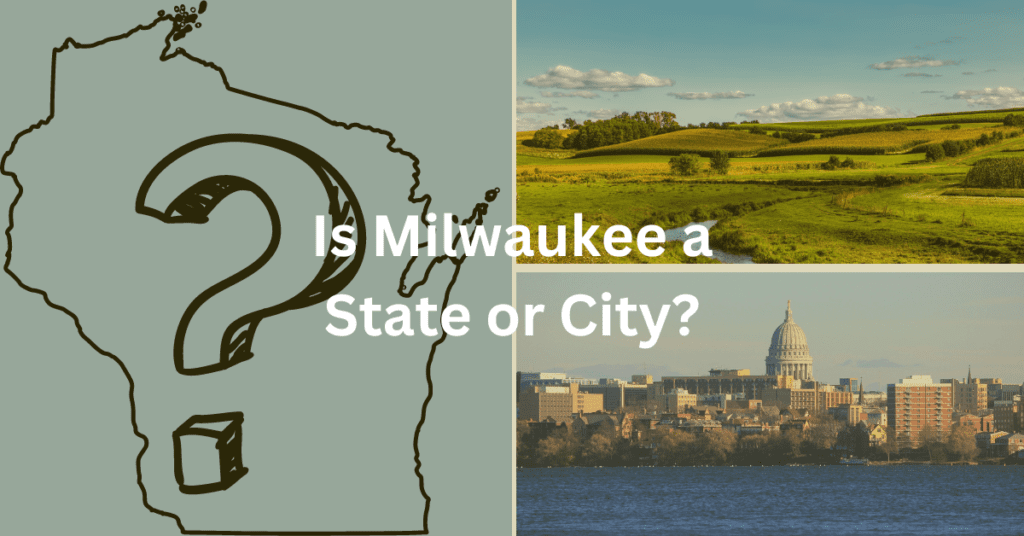Milwaukee is a city in the U.S. State of Wisconsin. Milwaukee is not a state.
Milwaukee is a City
Milwaukee is a city in the U.S. State of Wisconsin. It is the most populous city in Wisconsin. The U.S. Census Bureau reports that Milwaukee 569, 330 residents as of July 1, 2021 (source).
When most people use the term “city,” they mean a large urban area. While this is the case with Milwaukee, the term “city” has a special usage in Wisconsin law.
In Wisconsin, the terms “city,” “village,” and “town” have very technical meanings. According to Wisconsin state law, a settlement is a city by virtue of the kind of government it has, not by virtue of its size. Some cities can be quite small, with a few hundred residents. On the other hand, some villages can be quite large. And, towns refer to noncorporate governmental subdivisions of counties that exercise municipal functions.
A good overview of this can be found in the “Wisconsin Legislator Briefing Book.”
Milwaukee is not a State
Since Milwaukee is a city in the State of Wisconsin, by definition it is not a state.
In the United States of America, a state is a subnational political entity with jurisdiction over a particular geographical area. This jurisdiction is shared with the national government of the United States of America. There are 50 states in the United States of America.
Wisconsin was admitted as a state to the United States of America on May 29, 1848. It is the 30th state to have been admitted into the United States. Previous to being a state, Wisconsin was known as the “Wisconsin Territory.”
Not all lands that belong to the United States of America are states. According to the United States Geological Survey, the United States also has jurisdiction over other kinds of entities, including the District of Columbia, various types of territories, commonwealths, “miscellaneous insular or outlying areas,” and “freely associated states.” Under this terminology, a “freely associated state” is used in the international sense as an independent country, rather than in the sense that Wisconsin is a state.

Types of Municipalities in Wisconsin
Cities
Cities in the state of Wisconsin can have either the mayor-council or the council-city manager structure of local government. Under the mayor-council structure of local government, both the mayor and the city council are elected by the public. Most Wisconsin cities have adopted this structure of local government. Under the council-city manager type of local government, the council is elected and then appoints a city manager.
There are 190 cities in the State of Wisconsin. These include cities like Milwaukee, Green Bay, and Sturgeon Bay.
Villages
Villages in the State of Wisconsin can have either the president-village board or the village board-village manager structure of local government. The vast majority of villages in the state of Wisconsin utilize the president-village board structure. Under the president-village board structure of local government, both the president and the village board are elected by the public. Under the village board-village manager structure, the village board is publicly elected, and the village board appoints the village manager.
There are 411 villages in the State of Wisconsin. These include villages like Ephraim, Forestville, and Ashwaubenon.
Other Political Entities in Wisconsin
Besides cities and villages, Wisconsin has several other types of political entities.
Counties
Wisconsin has 72 counties. Counties in the State of Wisconsin serve a dual purpose. On the one hand, they are units of local government that serve general local governmental needs. On the other hand, they are also administrative arms of the State of Wisconsin. Counties in the State of Wisconsin include Milwaukee County, Brown County, and Door County.
Towns
Wisconsin has 1,253 towns. The legal definition of a town in the State of Wisconsin is different than the common definition of town that many people use. Many people think of towns as having an urban or suburban pattern of settlement. However, according to Wisconsin State Law, any land that is not covered by a municipality like a city or a village is part of a town.
Towns in Wisconsin have historically had a rural character. However, this is not always the case. Some towns have experienced much growth and have suburban and even urban settlement patterns.
Town populations can range from 40 residents to over 22,000 residents.
Towns are general-purpose units of local government that perform and provide various kinds of municipal functions and services.
Towns in the State of Wisconsin include Gibraltar, Sevastopol, and Clay Banks.
Indian Tribes
11 federally recognized Indian tribes are geographically within the borders of the State of Wisconsin. However, these tribes generally do not fall under state law but rather are governed by tribal law and federal law.
Tribes in the State of Wisconsin include the Oneida Nation, the Menominee Tribe, and the Ho-Chunk Nation.
Unincorporated Villages
There are many areas within the State of Wisconsin with more tightly built residential patterns that even have road signs designating them. These are often known as “unincorporated villages.” Such unincorporated villages do not fall under Wisconsin state law as a unit of local government. However, socially they often function as important locations for living, business, and industry.
Summary
- Milwaukee is a city in the U.S. State of Wisconsin.
- Milwaukee is not a state.
- In Wisconsin, the term “city” refers to the kind of government employed by an incorporated settlement.
- Other kinds of local governments in Wisconsin include villages, towns, and counties.
